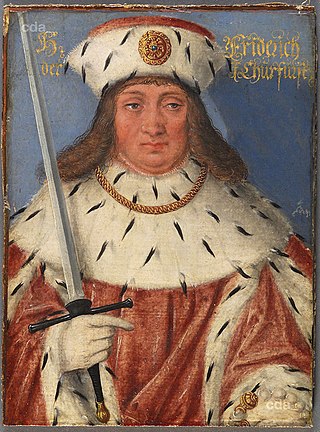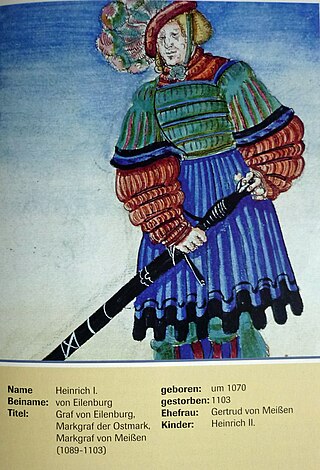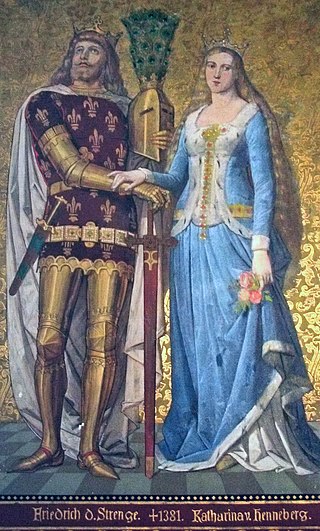
Frederick I, the Belligerent or the Warlike, a member of the House of Wettin, ruled as Margrave of Meissen from 1407 and Elector of Saxony from 1423 until his death.

Frederick III, the Strict, Landgrave of Thuringia and Margrave of Meissen, was the son of Frederick II, Margrave of Meissen and Mathilde of Bavaria.

Jacob I of Baden, was Margrave of Baden-Baden from 1431 to 1453.
Gertrud of Brunswick was Countess of Katlenburg by marriage to Dietrich II, Count of Katlenburg, Margravine of Frisia by marriage to Henry, Margrave of Frisia, and Margravine of Meissen by marriage to margrave Henry I.
Theodoric I, called the Oppressed, was the Margrave of Meissen from 1198 until his death. He was the second son of Otto II, Margrave of Meissen and Hedwig of Brandenburg.

Henry I (1070–1103), nicknamed the Old, a member of the House of Wettin, was Count of Eilenburg as well as Margrave of the Saxon Eastern March from 1081 and Margrave of Meissen from 1089 until his death.
Otto II, the Rich, a member of the House of Wettin, was Margrave of Meissen from 1156 until his death.

Philip William, Prince in Prussia was a Prussian Prince, was the first owner of the Prussian secundogeniture of Brandenburg-Schwedt and was governor of Magdeburg from 1692 to 1711.

The Dohna Feud was a 14th-century dispute between the burgraves of Dohna, who resided in the Eastern Ore Mountains of Central Europe, on the one hand and Saxon nobleman, John of Körbitz and the Meißen Margrave William I on the other. The feud lasted from 1385 to 1402.

Emilie of Saxony was Margravine of Brandenburg-Ansbach as the third wife of Margrave George the Pious of Brandenburg-Ansbach. Since his two earlier wives died before his accession, she was the only one to hold the title of Margravine.

Catherine of Henneberg was a Countess of Henneberg by birth and from 1347 by marriage Margravine of Meissen, Landgravine of Thuringia, etc. She was the wife of Margrave Frederick the Severe of Meissen. Via her, the House of Wettin inherited her father's Franconian possessions.
Wilhelm II, the Rich was the second son of Margrave Frederick the Strict of Meissen and Catherine of Henneberg.

Dohna Castle on the once important medieval trade route from Saxony to Bohemia was the ancestral castle seat of the Burgraves of Dohna. Of the old, once imposing double castle only a few remnants of the walls remain. The ruins of the old castle are located on the hill of Schlossberg near the subsequent suburb of the town of the same name, Dohna, in the district of Sächsische Schweiz-Osterzgebirge in Saxony, Germany.

Landgrave Balthasar of Thuringia was Margrave of Meissen and Landgrave of Thuringia from the House of Wettin.

Albert I, called the Proud, a member of the House of Wettin, was the Margrave of Meissen from 1190 until his death.
Margrave Henry I was a member of the House of Ascania and Margrave of Brandenburg-Stendal and Landsberg.
Frederick Tuta, a member of the House of Wettin, was Margrave of Landsberg from 1285 and Margrave of Lusatia from 1288 until his death. He also served as regent of the Margraviate of Meissen.
Louis of Meissen was a German nobleman from the House of Wettin. He was Bishop of Halberstadt and later Bishop of Bamberg, then Archbishop of Mainz and finally Archbishop of Magdeburg.
Theodoric IV, Landgrave of Lusatia, also called in German Diezmann, or Dietrich III was a member of the House of Wettin. He was Margrave of Lusatia from 1291 to 1303. He was also Margrave of Osterland from 1291 until his death, and Landgrave of Thuringia, as Dietrich I, from 1298 until his death.
Agnes of Landsberg was a German noblewoman. She was the third child of Conrad II (1159–1210), Margrave of Lusatia, and his wife, Elisabeth, the daughter of Mieszko III the Old (1126–1202), Duke of Poland. She was a daughter-in-law of Henry the Lion.











